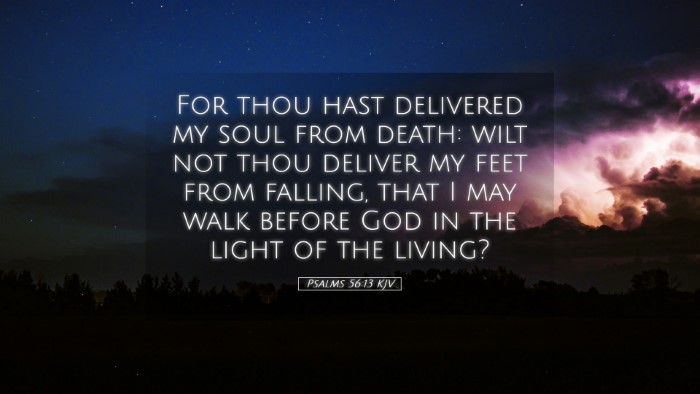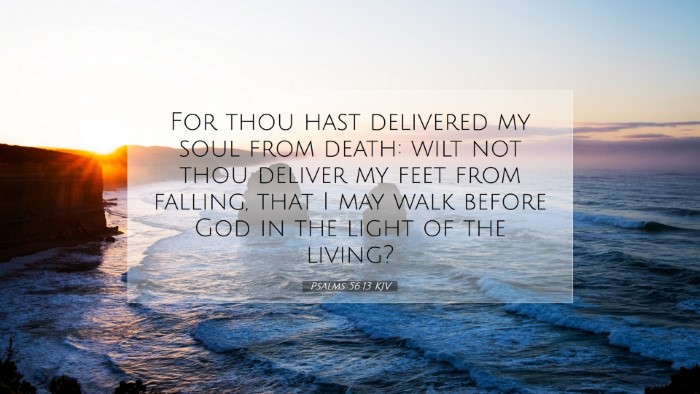Psalms 56:13 Commentary
Psalms 56:13 states:
"For You have delivered my soul from death, Yes, my feet from falling, That I may walk before God In the light of the living."
Introduction
This psalm profoundly expresses the psalmist's reliance on God during times of distress and persecution. The theme of deliverance permeates this passage, providing comfort and encouragement to believers. In examining Psalms 56:13, we gain insights from the commentaries of Matthew Henry, Albert Barnes, and Adam Clarke, which amplify our understanding of its spiritual significance.
Thematic Elements
-
Divine Deliverance
This verse emphasizes God's salvation. The psalmist acknowledges that it is God who has delivered him from death, a theme echoed in many psalms. Matthew Henry reminds us that this deliverance is dual—spiritual and temporal. It assures believers of God's sovereignty, as He is capable of saving not only from physical peril but also from spiritual decay.
-
Walking in the Light
The mention of walking before God in the light of the living signifies a life lived under God’s guidance and favor. Adam Clarke notes that this imagery represents a life of righteousness and obedience, contrasting the darkness of sin and despair. The light symbolizes God's presence and guidance, essential for a faithful walk.
-
The Assurance of Faith
Albert Barnes highlights the importance of faith in this verse. The psalmist expresses thankfulness for deliverance, showing that true faith responds with gratitude. This acknowledgment of God's intervention encourages believers to cultivate a heart of worship and trust, especially amidst trials.
Textual Analysis
The structure of Psalms 56:13 can be divided into two main parts:
-
Deliverance from Death
This phrase encapsulates the essence of God’s power over life and death. The psalmist’s situation reflects a constant reality of threats that test faith. Matthew Henry elaborates that God's deliverance is not merely a historical account but an ongoing assurance for believers facing their 'giants' in life.
-
Continuation in Life
The conclusion of the verse reminds the faithful of the purpose of God's deliverance. It is not just a salvation from peril but an invitation to live purposefully. Adam Clarke articulates that "to walk before God" implies a relationship characterized by devotion, an acknowledgment of God’s lordship that inspires holiness in daily living.
Theological Implications
Psalms 56:13 raises significant theological themes that resonate throughout scripture:
-
The Nature of God
This verse reveals God as a protector and a deliverer, which aligns with His character throughout the Bible. His readiness to save speaks to His unwavering love for humanity.
-
Human Dependence on the Divine
The acknowledgment of God's hand in deliverance reflects a profound understanding of human limitations and the need for divine intervention.
-
The Call to Righteous Living
Walking before God requires ongoing commitment to a life of righteousness, which is a recurring theme in both the Old and New Testaments, encouraging believers to reflect God's light in the world.
Practical Applications
For those engaged in pastoral ministry, teaching, or personal devotion, Psalms 56:13 offers the following applications:
-
Encouragement in Trials
This verse serves as a powerful reminder that God delivers His people. Pastors can use this to encourage congregants going through difficult times, emphasizing that their struggles are not in vain, and God’s protection is assured.
-
Call to Gratitude
Implementing a heart of thankfulness for God’s deliverance can transform one’s spiritual outlook. Teachings can center around cultivating gratitude as a response to God's grace.
-
Modeling Righteous Living
Encouraging believers to walk in the light and align their lives with God's word can lead to stronger communities of faith displaying God's character to the world.
Conclusion
Psalms 56:13 encapsulates a profound truth about God's deliverance, the call to walk in His light, and the assurance we have through faith. The insights from Matthew Henry, Albert Barnes, and Adam Clarke deepen understanding and foster an environment of trust and reliance on God's goodness. This verse not only calls believers to reflect on their relationship with God but also challenges them to live in a way that glorifies Him in every circumstance.


